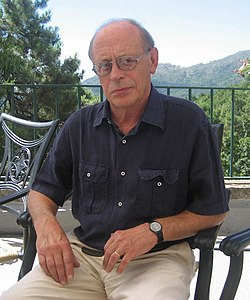Antonio Tabucchi
| Antonio Tabucchi | |
|---|---|
 |
|
| Born |
24 September 1943 Pisa, Italy |
| Died | 25 March 2012 (aged 68) Lisbon, Portugal |
| Occupation | Novelist, short-story writer |
| Nationality | Italian, Portuguese |
| Period | 1975–2012 |
| Spouse | María José de Lancastre |
Antonio Tabucchi (Italian: [anˈtɔnjo taˈbukki]; 24 September 1943 – 25 March 2012) was an Italian writer and academic who taught Portuguese language and literature at the University of Siena, Italy.
Deeply in love with Portugal, he was an expert, critic and translator of the works of Fernando Pessoa from whom he drew the conceptions of saudade, of fiction and of the heteronyms. Tabucchi was first introduced to Pessoa's works in the 1960s when attending the Sorbonne. He was so charmed that, back in Italy, he attended a course of Portuguese language for a better comprehension of the poet.
His books and essays have been translated in 18 countries, including Japan. Together with his wife, María José de Lancastre, he translated many works by Pessoa into Italian and has written a book of essays and a comedy about the writer.
Tabucchi was awarded the French prize "Médicis étranger" for Indian Nocturne (Notturno indiano) and the premio Campiello, and the Aristeion Prize for Sostiene Pereira. In later life he was mentioned as a contender for the Nobel Prize in Literature, a feat he never achieved.
Antonio Tabucchi was born in Pisa but grew up at his maternal grandparents' home in Vecchiano, a nearby village.
During his years at university, he travelled widely around Europe on the trail of the authors he had encountered in his uncle's library. During one of these journeys, he found the poem "Tabacaria" (tobacco shop) in a bookstall near the Gare de Lyon in Paris, signed by Alvaro de Campos, one of the heteronyms (a kind of poetical personality) of the Portuguese poet Fernando Pessoa. It was in the French translation by Pierre Hourcade. From the pages of this volume he extracted the intuition of his interest in his future life for at least twenty years.
...
Wikipedia
